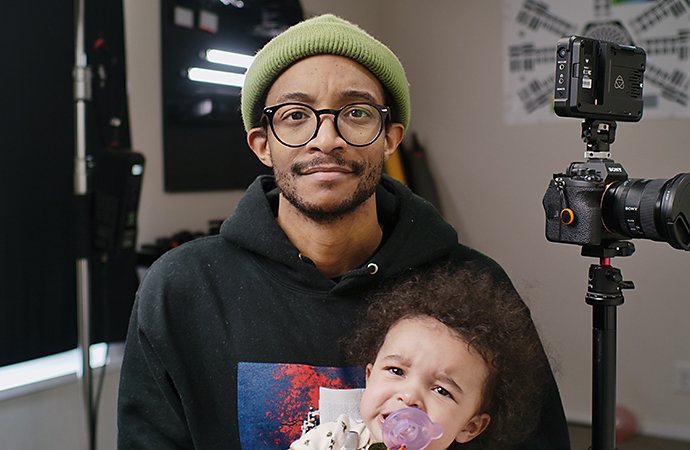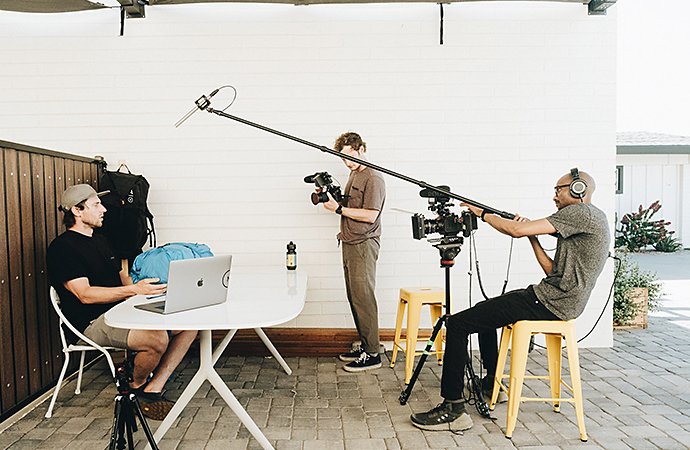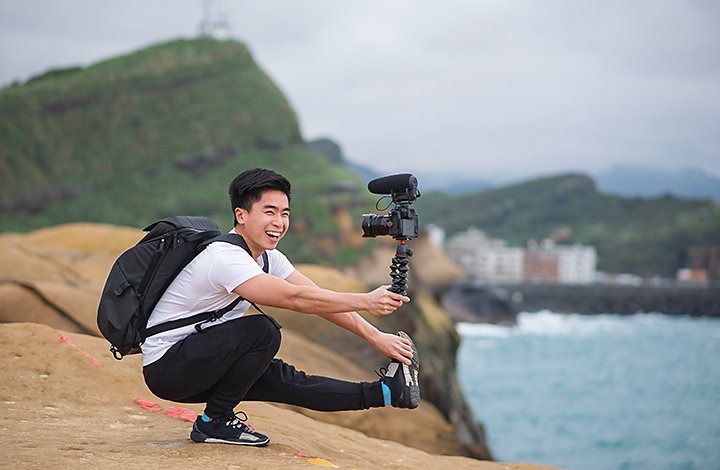Creating long videos for the web and beyond.
From marketing pieces to YouTube videos and beyond — long video content requires special considerations. Get tips to make yours captivating.
Video by Cody Liesinger
Going long in a world of short clips.
With the popularity of social media platforms like TikTok and commonly held beliefs about ever-shrinking attention spans, shorter videos are often upheld as the new standard. But some ideas need more space than 60 seconds. “Long-form filmmaking for documentaries or tutorials is a vast opportunity, because you’re packing in more information,” says content creator Joshua Martin. “You are trying to explain more of the story and immerse the viewer in the content.”
How long is long?
“This might sound ridiculous, but for marketers, anything longer than five minutes is a long video,” says video editor Cody Liesinger. “Of course, you’ve got filmmakers like Scorsese making four-hour films for Netflix. And technically a feature film starts at 50 minutes. But even five minutes, for an audience, that’s a commitment.”
The advantages of long videos.
Long videos give the viewer more time to sit with a topic. “With short content, you’re constantly editing down to get to the point. And that’s a fantastic skill,” says Martin. “But sometimes you need to bring someone along on a journey to let a story sink in and breathe.” Long videos also give the content creator more to work with. Plus, you can always repurpose longer YouTube videos into shorter clips for use on different channels.
How to keep long videos compelling.
The concern with longer videos is holding the audience’s attention. Achieve this by presenting your topic in an enticing way and editing your video to flow at a good pace. “Long videos are dictated by story and platform, but the challenge they present to an editor is pacing,” says Liesinger. “The longer your video is, the more important pacing is.”
Editors and content creators have more time to play with when making long videos, but the strategy for edits becomes more complex. Find balance between building intrigue and staying true to the information. “You need to keep people guessing while also telling the story the way it needs to be told,” says Liesinger. “With longer form content, it becomes chess instead of checkers.”
Engage your audience.
In the first 10 to 15 seconds, show the viewer why they should stick around. For something like an educational video, this could be as simple as explaining what information you’ll be sharing. “In this case, know the story you want to tell,” says Martin. “And if you’re able to explain that within the first 15 seconds of the video, that’s a good place to be in.”


Images by Joshua Martin
For more complex marketing or editorial content, it’s about fuelling the viewer’s curiosity with questions that can only be answered by watching the rest of the video. “The part that lands on the editor is making sure the story in the first 15 seconds is told in a way that asks more questions than it answers,” says Liesinger.
Mind your metrics.
If the video platforms you use have analytics tools, use them to see when your audience drops off and stops watching. Try to notice what you might want to change next time you upload a video to hold the target audience’s interest longer. If you’re posting on a YouTube account, remember that a higher audience watch time will encourage the platform’s algorithm to more prominently feature your video.
Occupying a unique niche in the online video community can help you build engagement. But remember to continue to cater your content to newcomers. Loyal followers of your YouTube channel will almost always watch your content all the way through. The goal for building engagement is to pique the interest of a new viewer.
Engage yourself.
If you’re not interested in your video content, your viewers won’t be either. Keep tabs on your fellow creators and do some research in your field. Continuing to educate yourself about your chosen topic can act as a spark for new content ideas. “If you’re continually learning about yourself and your interests, you’re always going to find something to talk about,” says Martin.
Also, open the door for new ideas to come from unexpected places. “Inspiration can come from anywhere, whether it’s a book, a painting, a conversation or a video game,” says Liesinger. “Just accept that any kind of art that moves you can be applied to your craft. It doesn’t matter what the medium is.”

Go to great video lengths.
An outstanding video starts with thorough planning. Even simple videos deserve a rough outline of a script. Write one up and then plan your shoot day so you’ll have all the equipment you’ll need.
Write it down.
Turn your initial video idea into a rough draught or a list of bullet points you’d like to cover. Slowly flesh it out into a more robust script that includes all the important points you need to make. To create a true shooting script, add notes for visual transitions, voice-over, necessary B-roll (background or filler footage) and more.
Preparing a script for your long videos reduces your chance of rambling or missing important points, which can negatively affect overall engagement. “I highly recommend writing a script, especially if you’re prone to going off on a straight,” says Martin. “I write scripts for everything. It often starts as bullet points or a note on my phone. Then from there, I flesh out almost word for word what I want to say.”
“Scripts keep you focused. If you’re not focused as a content creator, your content is going to be all over the place,” says Martin. “And the people viewing it are going to notice how well you did or did not plan it out.” Most tutorials or explainer videos can stop at a script, while more complex or stlylised films require storyboards as well, for a complete visual plan before the shoot begins.
Gather your gear.
If you’re first starting out, use whatever you have on hand. To film at home, all you really need is your iPhone, a window, a tripod and a mic. “Look for a space in your house that has good natural light coming in. If it’s too harsh, put up a sheer curtain to diffuse it,” says Martin.
Even if you shoot with your phone, a tripod can keep it steady for a professional look. And finally, a microphone to capture sound is a must. “If you do spend money, spend money on a mic. Good audio will make or break any video,” says Martin. “Good audio and a good idea.”
Shoot like a pro.
Try to memorise your script ahead of your shoot. Reading from your notes can be handy, but it’s also noticeable for the viewer. Going by memory keeps things natural and relaxed. If there’s something you need to get verbatim from the script, practice that line repeatedly until you get it.
“I try to do everything from memory,” says Martin. “I want to make a connection and make eye contact with the camera. But if my eye is veering off to my notes, it just takes me out of it.”
Add visual and audio cues for yourself while you film to make it easier to edit your video file later. After you finish a take that you feel really good about, clap your hands together once loudly. This will add a spike in your audio timeline on your editing software, so you’ll know where to jump to for your favourite takes.

Get all you need to edit longer videos.
Adobe Premiere Pro has advanced features that make it faster than ever to edit videos on your computer or mobile device. Re-sort your clips, add professional transitions and drop in stock audio sound effects and music clips. There’s much to explore in Premiere Pro, but take your time.
Rest between shooting and editing.
A break between filming and editing can benefit the process. “I actually wait a bit before I start editing, just to give my mind a rest,” says Martin. “Because when you come back fresh, you have a better perspective on how you want to cut your video. And you’re a better editor that way.”
Repurpose your footage.
Once you have a finished product, cut it down into different versions customised for each channel you want to share it on. Different platforms have different limitations in terms of maximum file size or length. While the Instagram feed only allows up to 60 seconds of video, an Instagram live video can be up to 60 minutes and an IGTV video can be up to 15 minutes (if you’re uploading from the mobile app) or 60 minutes (if you’re uploading from the web).
Each platform has its own ideal aspect ratio as well, such as a 9.16 vertical frame for IGTV or Stories, a 16:9 horizontal frame for YouTube or Vimeo or a 1:1 square frame for the Instagram feed. The Auto Reframe feature in Premiere Pro makes it easy to quickly reframe your shot into a new aspect ratio while keeping the action front and centre.
Gather some simple supplies, capture some action and see what types of 5- to 50-minute videos you can create.
Contributors
Do more with Adobe Premiere Pro.
Make visually stunning videos virtually anywhere — for film, TV and web.
You might also be interested in…
Get B-roll footage that makes video editing easier and helps you to keep your audience engaged.
Introduction to video editing.
Learn the principles of video editing and practical tips for both big and small screens.
Learn how to create a shot list that guides the crew through all of the day’s camera set-up.
Lossy or lossless? Compressed or uncompressed? Find the audio format that fits your needs.
Get Adobe Premiere Pro
Create flawless productions with the industry-leading video editing software.
7 days free, then €27,08/mo.



